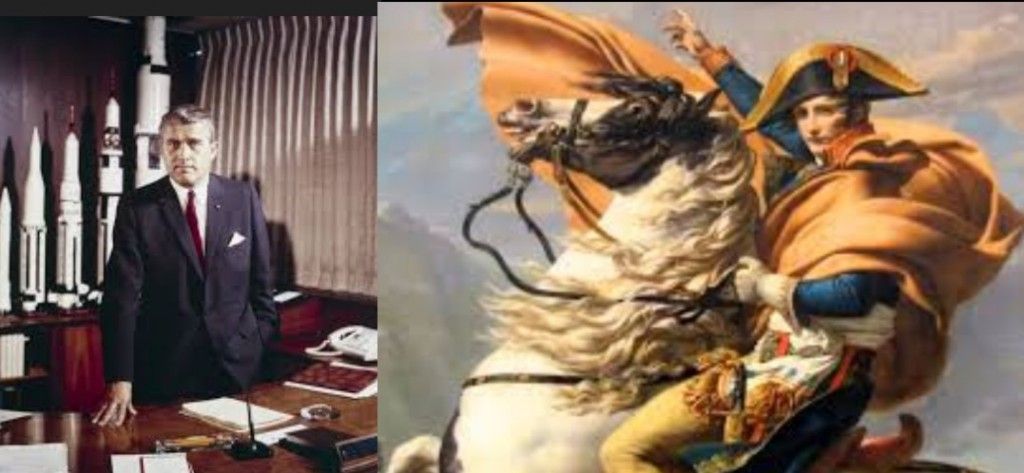The Lifeboat Foundation Worldwide Ambassador Mr. Andres Agostini’s own White Swan Education Elucidated By Napoleon Bonaparte And Dr. Wernher Von Braun:, Countermeassuring Every Unthinkable Black Swan, at https://spanish.lifeboat.com/blog/2014/04/white-swan
Education Elucidated By Napoleon Bonaparte And Dr. Wernher Von Braun:
Reflecting On The Education We Immediately Need! Napoleon Bonaparte On Education (1769 — 1821) observed:
“…Education, strictly speaking, has several objectives: one needs to learn how to speak and write correctly, which is generally called grammar and belles letters. Each lyceum has provided for this object, and there is no well-educated man who has not learned his rhetoric [….] After the need to speak and write correctly comes the ability to count and measure. The lyceums have provided this with classes in MATHEMATICS embracing arithmetical and MECHANICAL KNOWLEDGE IN THEIR DIFFERENT BRANCHES [….] The elements of several other fields come next: chronology, geography, and the rudiments of history are also a part of the education of the lyceum [….] A young man who leaves the lyceum at sixteen years of age thence knows not only the mechanics of his language and the classical authors, the divisions of discourse, the different figures of eloquence, the means of employing them either to calm or arouse passions, in short, everything that one learns in a course on belles letters. He also would know the principal epochs of history, the basic geographical divisions, and how to compute and measure. He has some general idea of the most striking natural phenomena and the principles of equilibrium and movement both with regard to solids and fluids [….] Whether he desires to follow the career of the barrister, that of the sword, or ENGLISH, or letters; if he is destined to enter into the body of scholars, to be a geographer, engineer, or land surveyor — in all these cases he has received a general education necessary to become equipped to receive the remainder of instruction that his circumstances require, and it is at this moment, when he must make his choice of a profession, that the special studies present themselves …”. [113]
DR. WERNHER VON BRAUN ON EDUCATION, (1912 — 1977and Father of the American Space Program) observed:
“…The average citizen today, of course, has far more scientific information at his disposal than did those greatest of intellects of earlier times. Yet paradoxically, I think that THERE HAS NEVER BEEN A GREATER NEED FOR INCREASED UNDERSTANDING AND APPRECIATION OF SCIENCE. It has been said that, although the choice of direction for our civilization will be determined through democratic process, it is there that the problem begins. TO MAKE RATIONAL CHOICES, THE AVERAGE CITIZEN MUST UNDERSTAND THE NATURE AND ROLE OF SCIENCE AT A TIME WHEN ITS BREADTH AND COMPLEXITY ARE INCREASING ALMOST EXPONENTIALLY [….] Conversely, the scientist, at a time when he can barely keep up to date in his specialty, must not isolate himself in his parochial interest. Instead, he should see his profession as a part of the larger world, to evaluate himself and his work in relation to all forces, especially the humanities, which shape and advance society. THE NEED, THEN, IS FOR AN EDUCATIONAL PROCESS RESULTING IN MORE SCIENTIFIC LITERACY FOR THE LAYMAN, AND MORE LITERACY IN THE HUMANITIES FOR THE SCIENTISTS [….] Man in this scientific age is free only to the extent that he has a grasp on himself and his surroundings. FREEDOM — THE ABILITY TO SPEAK, THINK, ACT, AND VOTE INTELLIGENTLY — is based largely on our ability TO MAKE CHOICES growing out of our understanding of the issues involved. With each advance of science, there is an invitation to more understanding. This is the essence of the burden borne by all peoples since the dawn of humanity. There must be widespread understanding of the role of science in modern society, both as to its limits and our dependence on its basic function as a tool for our survival. This is the imperative for scientific literacy [….] How do we encourage scientific literacy? I THINK THE PROBLEM IS HOW TO INSTILL IN STUDENTS A PERMANENT DESIRE TO LEARN. All youth is endowed with curiosity from the very beginning. What can education process do, not only to keep this natural curiosity alive, but to make it a permanent part of the individual drive? … ”










Comments are closed.